last week Dirk Deppey drew our attention to a set of Bernie Wrightson prints from 1978 posted my Mr. Door Tree. Something that happened occasionally in the artist's better work is that he would have a perfectly lovely figure drawing standing out in the middle of his overwrought detail.
The arrival of Wrightson circa 1970 is the exact point, I can see in retrospect, at which I lost all interest in American comic books (allowing for the occasional curiosity of one who must still make his living from drawing, and also the enduring fondness for the foolish nonsense of my childhood). He was the first artist that I recognised (though not at first sight) as a 'fan,' whose style was sewn together Frankenstein-like from bits and pieces of earlier artists. Of course all art must build upon earlier visions to a greater or lesser extent, but the case here was one where the sources were so ignoble and ordinary (in contrast for instance to Infantino's fascination with the design ideas of Frank Lloyd Wright) that even a teenage bozo like me could find them, specifically the artists of the EC horror comics. There was a touch of the soiled flair of Frazetta's street-corner toughs, the shambling gait of a Jack Davis graverobber, the viscous saliva from the mouths of Ingels' fiendish plotters, and any suggestion of conventional pleasantness always cast a shadow of sarcastic insincerity.
Coincidentally Deppey, in his next day's posting, links to an article in the New Yorker by Louis Menand that puts the problem in perspective.
THE HORROR: Congress investigates the comics.I still believed in the idea of comic books as art, but from then on it was entirely in the abstract, existing in the realm of possibility only. After Wrightson in fact things got worse; the Wein-Wrightson Swamp Thing was a tedious compendium of horror movie cliches, and much as I was happy to see Alan Moore make a living from his writing, the later revival of the character confirmed my certainty that everything had gone completely wrong. It was a monster eating and regurgitating itself.
It’s true that respect for the comic book as an art form can be a little overdone. George Herriman’s “Krazy Kat” has a kind of artistic genius; “The Vault of Horror” is just dumb. It’s supposed to be dumb: it’s for eleven-year-olds.
The Menand article is about Fred Wertham and his attack on the comic books in the ealy 1950s that brought about the formation of an official censor (being a review of Hajdu's recent book on the subject). Wertham is another of those indviduals, like Vince Colletta, that the mindless herd of comic book fans like to loathe. Anyone prepared to stop and think clearly is to be applauded:
Bart Beaty’s “Fredric Wertham and the Critique of Mass Culture” ($22, paper; University Press of Mississippi) makes a strong case for the revisionist position. As Beaty points out, Wertham was not a philistine; he was a progressive intellectual. His Harlem clinic was named for Paul Lafargue, Marx’s son-in-law. He collected modern art, helped produce an anthology of modernist writers, and opposed censorship. He believed that people’s behavior was partly determined by their environment, in this respect dissenting from orthodox Freudianism, and some of his work, on the psychological effects of segregation on African-Americans, was used in the Supreme Court case of Brown v. Board of Education.
Beaty is unimpressed by the claim that the horror comics were somehow part of a popular-culture avant-garde, and he thinks Gaines’s attempt to portray himself and his company as subversive artists oppressed by the establishment has fooled many people. “Ultimately,” he writes, “Fredric Wertham aligned himself with the most defenseless portion of postwar American society, children. His critics have aligned themselves with an industry that targeted racist, sexist, and imperialist propaganda at minors. He was one man, operating out of a free clinic in Harlem, facing a multimillion dollar per year industry organization that hired private detectives to tail him and intimidate his staff.”
*******
late update. To the fellow in comments who perhaps thinks I'm critcizing an artist of being 'derivative,' note that this is not a term I would ever use in this way. All art must be derivative. But the artist must choose whether his work is to be derivative of worthy ideas or of facile mannerisms. There is a philosophy of the practice of art that works upon the principle that all habits and mannerisms impede the reaching for truthfulness, and should be excised from the work as soon as the artist becomes aware that he is exercising them. I wasn't finding this kind of exacting discipline in comic books is all I'm saying. Don't let me stop YOU from reading them.
Labels: censorship, comics crit 1
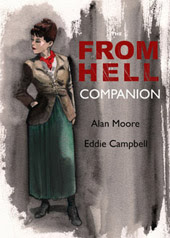
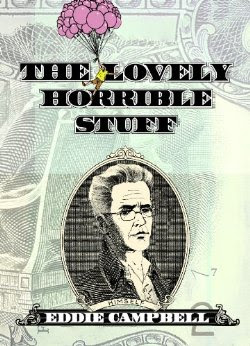

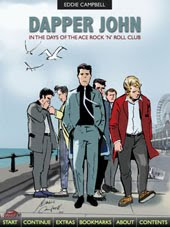
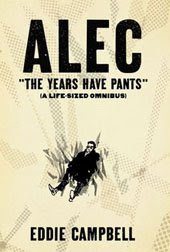
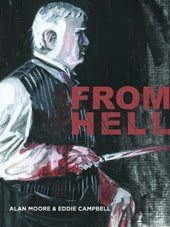
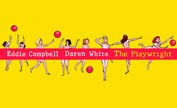
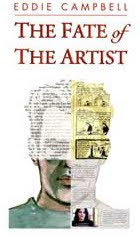


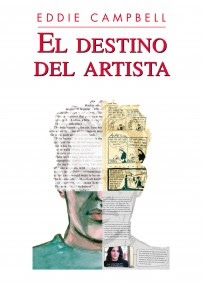
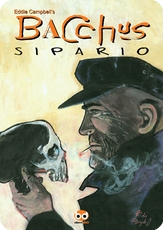
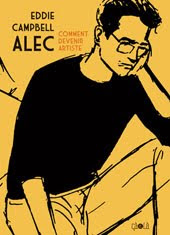

18 Comments:
Some years ago I paid $200 for a Berni Wrightson original. I bought it from the estate of a guy who got blown in half by a 12-gauge shotgun at his front door. (But that's beside the point.)
A couple of years ago I sold the piece of artwork for $16K.
I wouldn't be surprised to see that piece fetch six figures someday. Maybe someday soon. Who knows?
I agree that Wertham had better sense and taste than he was given credit for in the comics community. I am not sure it follows, however much it is clear that many of the crime and horror (and war) comics of the early 50s were crude, dumb, racist, and otherwise guilty of poor craft, that they should be banned. This is what Wertham's supporters took from his conclusions, and it's why I for one find his work difficult to defend, even in light of his apparent good intentions and noble character. I can't agree that anyone propounding hysteria should be applauded.
You applaud whoever you like.
I was applauding Beaty.
Halle-f**kin-lujah. Someone finally said it and put into context:
"He was the first artist that I recognised (though not at first sight) as a 'fan,' whose style was sewn together Frankenstein-like from bits and pieces of earlier artists."
I applaud that insight from that time, thanks.
Very thought-provoking comment about Wrightson. Although I've seen some of the earlier artists that influenced him, I don't have enough history with them to see him as derivative. For me, his work largely defines the horror style, because it's the first stuff I encountered and liked.
Re: the Moore era SWAMP THING comment:
Well, shit, there goes my career. Might as well flush!
As for Beaty, see my comments on today's post, above. It's a grand book he wrote in many regards, but Wertham's arguments in SEDUCTION are still suspect for a multitude of reasons -- compromised above all by his convoluted writing style in SEDUCTION -- and Beaty misrepresents key bits of comics history to make his case at times.
You should have finished Tyrant, damn you!
The biography of a dinosaur!.
That was your claim to a slice of immortality.
Sigh.
Do you bring up BIG NUMBERS every time you and Alan chat? I reckon not.
I've covered it most comprehensively here:
http://albert.nickerson.tripod.com/creatorsbillofrightsbist8.html
Dave Sim's response is buried here (scroll down a ways, it's there):
http://groups.yahoo.com/group/cerebus/message/103644
In short, Dave wrote:
"Al also sent a very long letter that Steve Bissette posted to the Creators' Bill of Rights discussion group. I'll admit that I probably had very little idea of what I was talking about…and what I was mostly talking about was how "Those a—holes in Vermont" (in Jim Valentino's immortal phrase which is far more affectionate on my part than I think it was on Jim's part when he delivered it back in the 1963 dust-up time period) looked to me from hundreds of miles away than how they actually were.
I was struck this time by Steve's reminder that his divorce lawyer had told him not to do anything but work-made-for-hire until his divorce settlement was finalized. I don't know if that was, indirectly, the straw that broke the camel's back but it certainly seems like a skuzzy—though financially sensible—thing to tell an artist to do. If he had told me that part before, it hadn't registered. Obviously I think that we would live in a much better society if creative freedom wasn't specifically targeted by family law in that way…and I can understand that Steve's priorities were different from my own.
This is really all I'm going to say on the subject: two things 1) I hope Steve does Tyrant again someday 2) Danny and Maia are great kids."
And that, by and large, was that. If anyone has been a harsher assessor of my relative value as an artist than you, Eddie, Dave is it (hey, from friends, I'll take it; from wankers, fuck 'em). It was a relief to bring that decade-long long-distance conversation to a meaningful conclusion.
Beyond that, there's also some followup on http://www.creatorsrights.com
Go to: Creators Rights Forum Index -> Creator's Rights Discussions on the discussion board --
And then: the thread entitled: "Post subject: Steve Bissette's letter: Dave Sim and 1963..." -- my letter, and Dave's reply, are there complete.
Not to raise expectations, but it's my goal to return to the lizard in the coming year. I'm pitching it as a graphic novel project, and if I can conceive or find a venue that earns me enough to keep on, that'll be fine. Time will tell, Eddie.
Thanks for the clarification, Eddie. I didn't really mean to use "derivative" in that way, either (quick post!) I play jazz guitar, and I think I see your distinction. If you tell me my playing reminds you of Kenny Burrell, it could be a good thing: you hear a similar sound, similar use of blues phrasing, that sort of thing. But if I just sound like I'm parroting some of Burrell's stylistic habits, that makes me a wanker.
Mark,
You can come round my house and sound exactly like Burrell any time you like.
I think you're suffering under 'the neurosis of innovation'.
I have no reason per se why every artist or musician shouldn't look or sound exactly the same. The only queston is whether the information is worth repeating.
(my favourite artist on the fantastic Four post-Kirby was Buckler because he imitated Kirby exactly. I love Secrest's work with Trumbauer just after Bix died because he sounded exactly like Bix and Bix wasn't around any more. in fact I love Hoagy Carmichael's Jewish Boy Blues because Manny Klein and Ray Lodwig both decide to just sound like Bix and it's a beautiful record.)
Now you're putting words in my mouth. I didn't say anything about "innovation," did I? Burrell's a big influence on me, but not because I consider him an innovator. He's just an excellent bebop guitarist whose style appeals to me. I'd say a big part of that appeal is the fact that he has an individual voice, though. Doesn't mean it wouldn't be appropriate to imitate his sound if the occasion called for it. Or that I can't enjoy a less individual-sounding player if I go to a jazz club. BTW, since I probably won't be able to take you up on your offer to come round your house, if you're curious about what I sound like, there's free MP3s here: http://music.download.com/marksullivantrio
sorry,
'the neurosis of innovation'
is a phrase i picked up somewhere to describe the modern concern about having one's own unique voice and the terror of being thought a plagiarist, etc. I've used it a few times around here. I was just trying to encourage you out of thinking you might be a 'wanker' for helping yourself to the tricks of one you admire. i'll check your sound file.
mark,
just listened.
You're an artist.
You don't need me preaching at you.
lovely work indeed.
ps.
you made me just go and fetch some Wes Montgomery off the shelf.... Body and Soul, Round Midnight...
If I can get you to fetch some Grant Green, too, then we'll be getting somewhere. It's funny about Wes Montgomery. He definitely was an innovator, and is arguably the most influential jazz guitarist ever. But he's about third on my personal list, after Burrell and Green, lovely though his playing is (not to mention technically frightening). Thanks very much for the compliment on my playing. It means a lot to me, one artist to another.
I once met a designer who boldly stated that she did not look at other peoples work, especially older stuff, because she was afraid it would stifle her creativity and drive her into the rut of imitation. She was obviously moronic as all her work looked like inferior copies of all the night club fliers and kmart ads at that time.
But she didn't LOOK at Kmart ads or night club flyers -- her work was PURE!
{- wiseass Bissette, enjoying the butcher's view)
Yep, and if you look up pure in the dictionary one of the definitions is "biology produced by continual inbreeding or self-fertilization and producing offspring with the same hereditary characteristics"
The thing is, I couldn't tell if she was lying, and therefore looking at kmart ads and flyers, or if the designers of kmart ads and flyers followed the same thought process...
Post a Comment
Subscribe to Post Comments [Atom]
<< Home